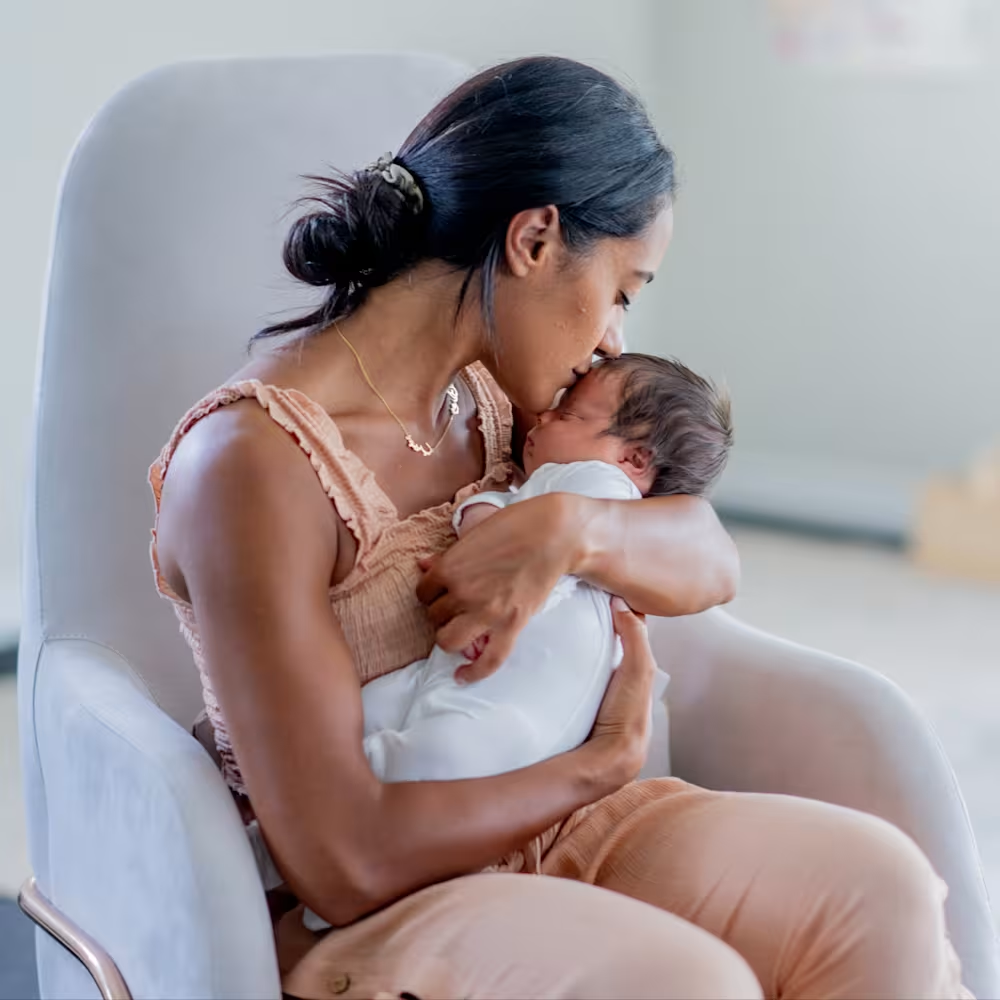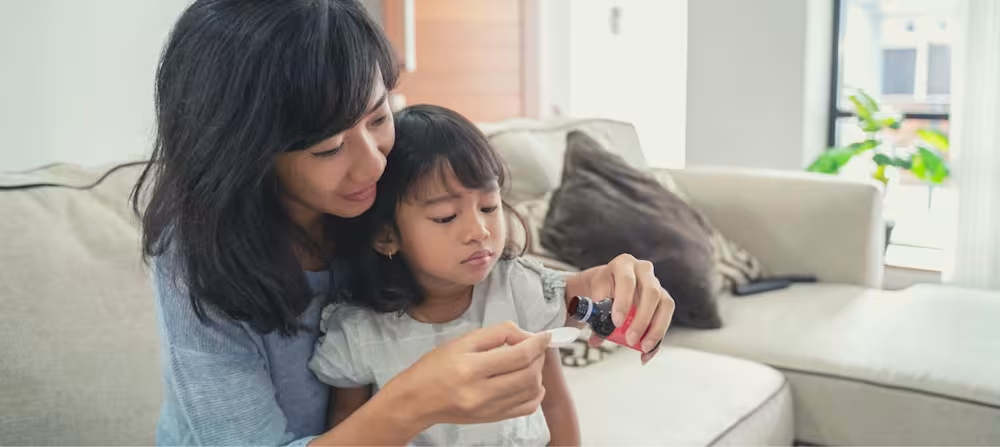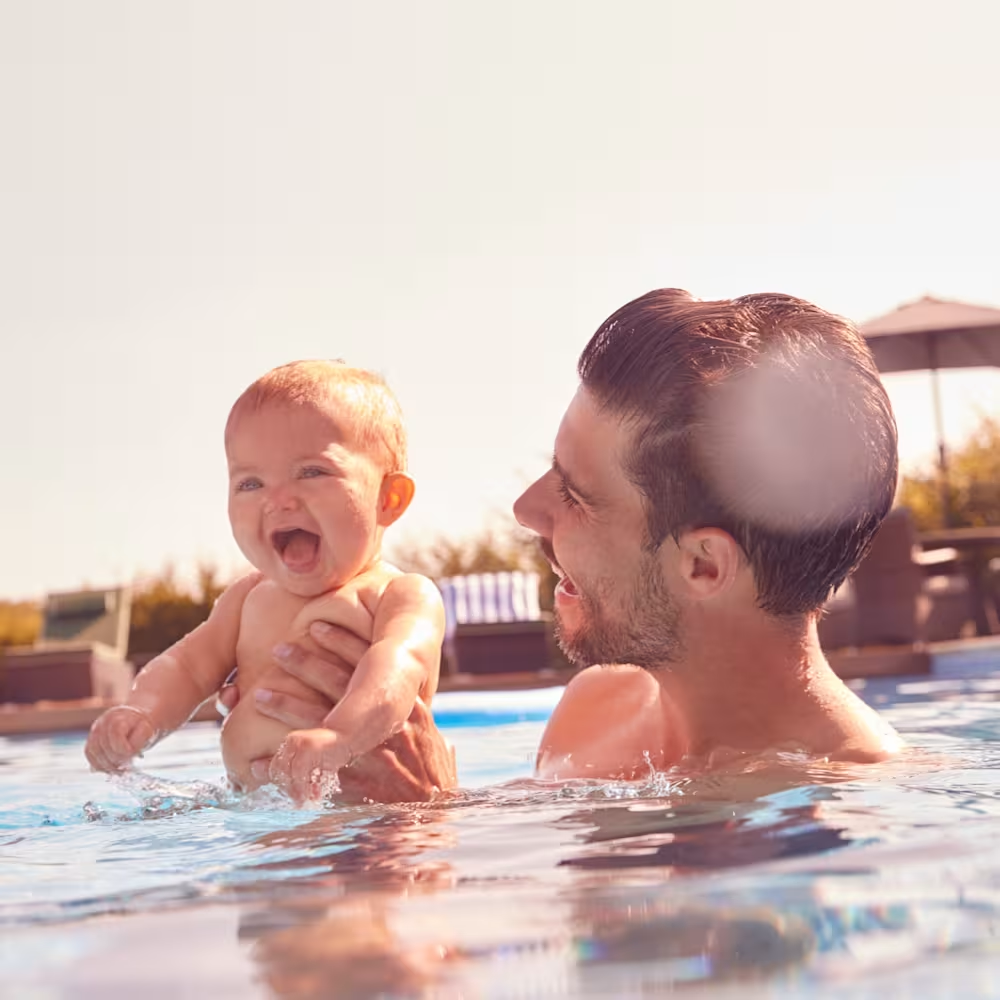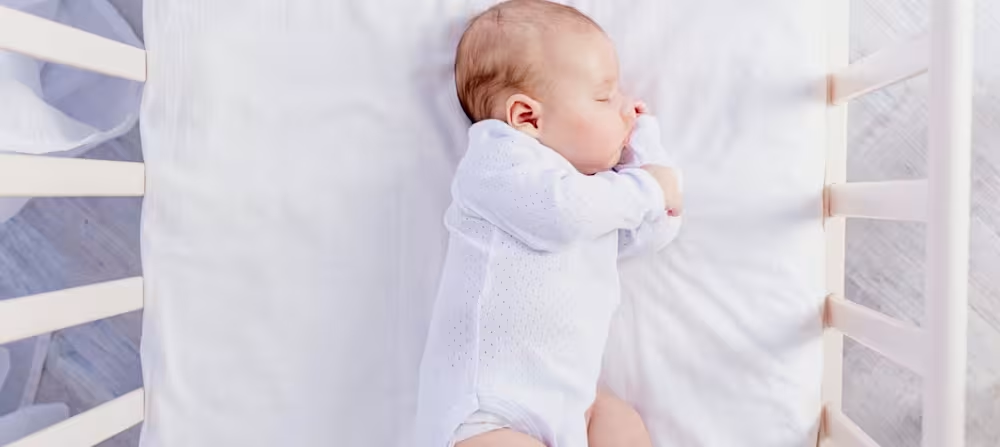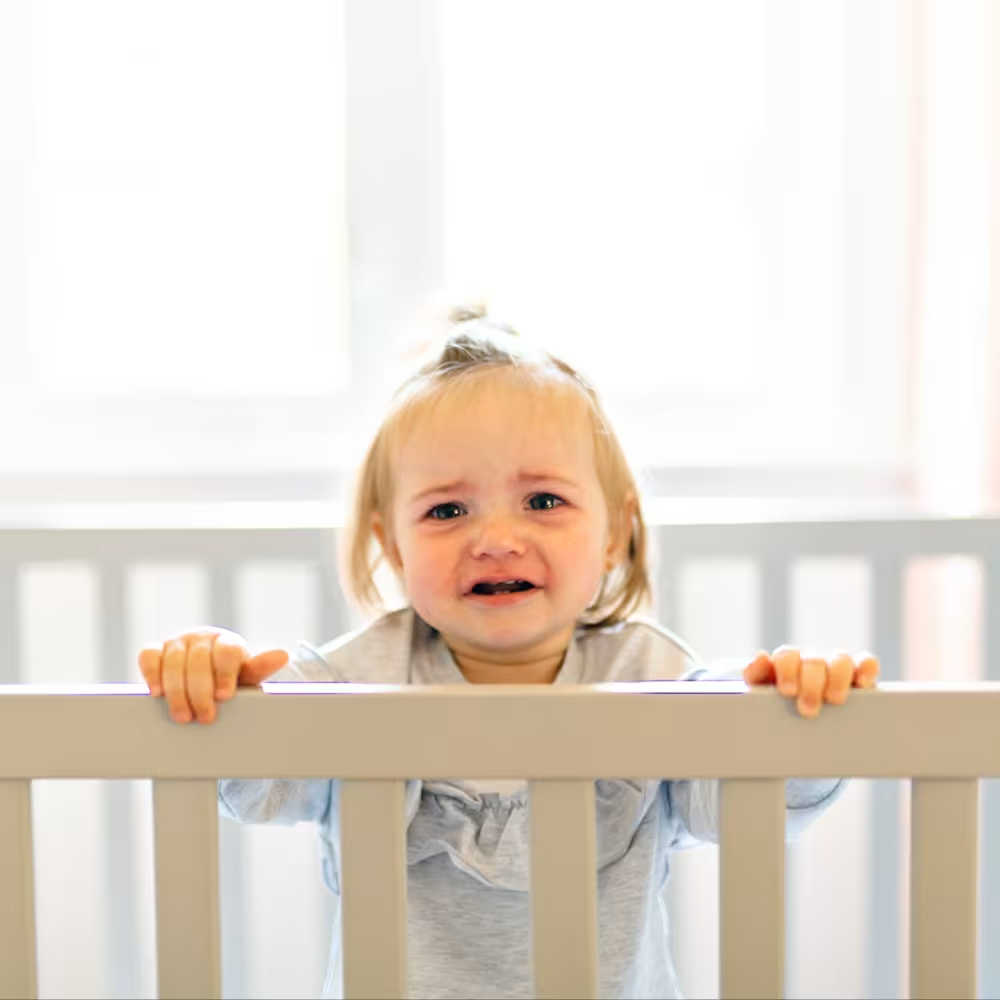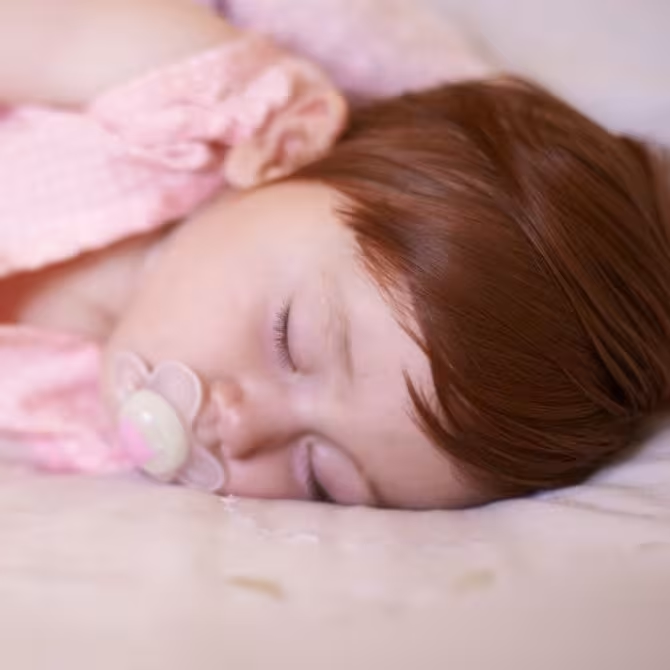Tips to get a sick baby to sleep
Updated Oct 16, 2025

It’s never fun when your baby is sick and not sleeping well, but those bouts of snot and sniffles are extremely common. Most babies will get sick 6 - 8 times [] during their first year! Children under 7 [] have immature immune systems and their upper airways aren’t fully developed until they’re of school age. It’s normal (and exhausting!) if you feel like your little one has a new cold every time you turn around.
Then it can be a vicious cycle when it comes to sick babies and sleep — they need rest to recover, but it’s hard to get good shuteye when they’re congested and not feeling well. In this article, we’ll let you know how to safely help your sick little one sleep, give guidance on fevers, and answer frequently asked questions about sleep when your child is under the weather.
How to get a sick baby to sleep comfortably
Everyone tells you that sick children need all the rest they can get, but this is often easier said than done. Those snotty noses and coughing spells can wreak havoc on sleep! However, there are some tried and true things you can try to help your little one get some shuteye while they’re under the weather.
Tip #1: Create a calm, dark sleep environment
When your child is sick, you want to do all you can to ensure they get in good naps and night sleep. If it isn’t already, trying to make their sleep space dark, cool, and quiet may help eliminate distractions and allow your little one to rest better. Consider using and if needed.
Tip #2: Try a cool-mist humidifier or steam treatment
Those tiny nasal passages can get plugged up so easily! Your baby may sleep better if you use a vaporizer or cool-mist humidifier that works to clear out congestion. Make sure to place the humidifier close enough to your sleeping child that the mist will reach them, but always place it out of their reach for safety reasons. Follow the manufacturer’s directions for cleaning and use to prevent mold and bacteria build-up as well. Most of these machines require new water every day.
If you don’t have a vaporizer or humidifier, steam can help similarly. Before sleep (or whenever they’re extra congested), run hot water in the bathroom with the door closed for a few minutes. Then take your baby in the room and snuggle them while they breathe in the steamy air. Of course, always supervise your child during these steam treatments and leave the room if they become overheated or unhappy.
Tip #3: Use saline drops and gentle suction
Let’s get that icky snot out of there! A couple of saline drops [] can help loosen congestion and then you’ll want to gently suction out the mucus using a bulb syringe or other tool (there are lots of options on the market). You can also use a wet cotton swab to carefully loosen any sticky snot. Using a bulb syringe without saline can work well too. The important thing is clearing up mucus as well as possible before your little one goes to sleep and also before eating times too, as it can be hard for babies to eat when they’re stuffed up.
Tip #4: Aim to keep baby well hydrated
Making sure your child is well hydrated with formula and/or breast milk (and water if baby is over 6 months) has a host of benefits, including helping them get the sleep they need while sick:
Promotes sleep — hungry babies have a hard time falling asleep and staying asleep
Helps regulate body temperature (especially if they have a fever)
Prevents dehydration
Supports their immune system
Loosens and thins mucus, making it easier for babies to breathe, especially during sleep times []
Do babies sleep more when sick?
It’s not uncommon for little ones to sleep more [] when they’re not feeling well as their body is working hard to fight the infection. They may be more fatigued in general and feel extra tired during the day, especially if their overnight sleep quality is poor. While this may temporarily derail your child’s sleep schedule, more rest is a good thing! Sleep boosts the immune system [], which can help get rid of the illness faster.
On the other hand, it may be harder for your baby to get the rest they need when they’re feeling icky and you may see . Factors like discomfort or pain from congestion, coughing, fever, etc. can make it difficult for children to fall asleep and stay asleep. Frequent night wakes [] and short naps are normal when babies are sick. We recommend offering extra comfort and support if this is the case to ensure your child gets the sleep they need to feel better. Also, do what you can to help clear up congestion before sleep times.
Best sleeping position for a congested baby
The [] recommends always placing babies flat on their backs on a firm, flat surface for sleep — even when they’re sick. Tactics like propping your infant up on a pillow or towel or elevating one end of their crib mattress are not recommended. Doing so may make it harder for your baby to breathe, as their neck may bend forward or fall to the side, restricting their narrow airway.
The [] cautions against letting your child sleep in a swing or car seat as well because they don’t provide enough support for safe sleep. They recommend transferring your baby to a flat surface as soon as possible if they’ve fallen asleep in a car seat or another carrier.
If your baby is very congested and having trouble sleeping, holding them for sleep is generally regarded as safe, except if there’s a risk that you will fall asleep too. Sleep-related infant deaths are up to 67 times higher [] if a child falls asleep with a caregiver on a soft surface.
Should I let my child sleep with a fever?
It’s important for a child with a fever to get plenty of rest and we don’t recommend keeping them awake when they’re tired. Even if they're sleeping more than usual, that’s OK. It’s normal for babies to veer from their typical sleep schedule while fighting off an illness.
If you’re giving your little one fever-reducing medicine (if they’re over 3 months and/or it’s been recommended by a doctor), avoid waking them to administer more medication unless their pediatrician has instructed you otherwise []. Instead, let them rest and give the next dose when they wake up.
Dressing baby with a fever at night
It can be tricky to figure out how to make your child comfortable for sleep when they’re sick, especially if they have a fever. Avoid overdressing your little one []. Opt for a single layer of lightweight clothing and avoid heavy clothes and blankets. Heavy layers can make your child more uncomfortable and prevent their body from cooling []. If your kiddo has the chills or is shivering, the AAP [] recommends giving them a blanket to try to make them more comfortable, but only if they’re over 12 months, per safe sleep recommendations []. Consider using a sleep sack for warmth if you have a younger baby.
How to get a baby back on a sleep schedule after an illness?
If your baby’s nap times and bedtime were thrown off when they were sick, you may be anxious to get them back to regularly scheduled programming once they’re feeling better. Note that some babies will re-adjust faster than others. Continue to provide comfort and patience while your little one recovers — they’ll get there!
It can be helpful to pay attention to and to determine sleep times during this transition, especially if their sleep patterns were very different while they were sick. Going back to a when returning to an may lead to less resistance at sleep times.
In general, we recommend keeping an eye on your baby’s overall mood and energy levels when determining if they’re getting enough sleep. If your baby’s schedule is consistently a little different after an illness and it appears that they’re content and well-rested, that’s OK! It’s expected that schedules will continue to evolve as your child grows and develops.
When to call the doctor
It can be tricky to know when your sick baby needs medical attention or they can safely rest and recover on their own. In general, you know your child best! If you notice any red flags or suspect there’s something more serious at play than a common cold, reach out to your little one’s doctor for advice. When in doubt, it’s usually best to err on the side of caution and consult your child’s healthcare provider.
The AAP recommends [] calling an emergency number (like 911 in the U.S.) and getting immediate help for your baby if they:
Struggle while taking each breath
Seem unable to make sounds or cry
Their lips or face are bluish in color
They may have something stuck in their throat
The AAP recommends [] calling your child’s doctor in the following instances:
Breathing is faster than usual
They look very sick or are unusually drowsy or fussy
Their lips or face turn a bluish hue when they cough (instead of persistently discolored)
Their continuous coughing is preventing them from sleeping, eating, or playing
They’re under 3 months [] and have a temperature of 100.4°F (38.0°C) or higher. (Rectal temperatures are considered most accurate for children under 12 months [].)
Temperature is repeatedly above 104°F (40°C) for any age child
Fever persists for more than 24 hours
A baby monitor can help you keep a close eye on a sick child while they’re sleeping. It’s also important to ensure your baby is feeding well and staying hydrated when they’re under the weather. Noting any changes in activity levels as well as appetite or wet diapers can be helpful information to give a doctor.
Takeaway
Babies usually get sick a lot over their first year of life — most will get 6 - 8 colds. Young children have undeveloped immune systems and spread germs easily, so it’s not uncommon to feel like your child’s nose is constantly running.
Sick babies may sleep more or less while they’re under the weather. This is normal! Do what you can to ensure they’re safely getting the rest they need during this time, even if it means their sleep schedule is temporarily derailed.
Things like using a cool-mist humidifier, removing mucus from their nose before sleep times, and adding extra snuggles to their sleep routine may help your little one get the rest they need while they’re fighting off a cold.
You know your baby best — don’t hesitate to call a doctor (or emergency number) if your child is experiencing extreme symptoms, has breathing problems, a fever, etc.
Share article:
Note: The content on this site is for informational purposes only and should not replace medical advice from your doctor, pediatrician, or medical professional. If you have questions or concerns, you should contact a medical professional.
15 Sources
Share article:
